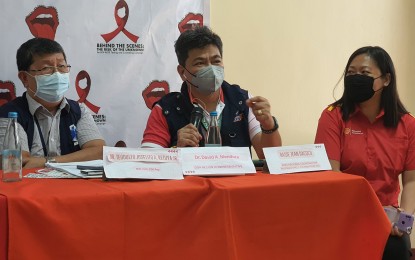
HIV/AIDS AWARENESS. Public health executives discuss the local landscape in the HIV/AIDS cases and updates during a press briefing in Cagayan de Oro City on Wednesday (Nov. 23, 2022). (From left to right) Dr. Teodulfo Joselito Retuya, the city health office epidemiologist; Dr. David Mendoza, DOH-10 local health support division chief; and Rasie Jean Dacoco, the Pilipinas Shell Foundation regional coordinator, attended the event. (PNA photo by Nef Luczon)
CAGAYAN DE ORO CITY – Northern Mindanao Region placed sixth overall in the Philippines with the most number of Human Immunodeficiency Virus/Acquired Immunodeficiency Syndrome (HIV/AIDS) cases, an official said Wednesday.
In a press briefing here, Dr. David Mendoza, the Department of Health-Northern Mindanao (DOH-10) local health support division chief, said the data was based on the September statistics this year.
"However, some of these individuals were tested outside the region, and later been tagged to where they originally reside," Mendoza said.
Mendoza, who was unable to share specific figures, said the region has 5 percent of the cumulative total of HIV/AIDS in the country.
He also said the average rate of cases increased on a national scale.
"In 2012, the daily average rate of HIV/AIDS cases was at nine per day; in 2022, it's now 42 per day," Mendoza said.
Dr. Teodulfo Joselito Retuya Jr., the city health office epidemiologist, cited reasons behind the figures.
"This is the (extensive) surveillance that we do, which means we do more testing. In places that have a lesser number of cases, how often do they make surveillance?" he said.
Since 1989, health units in the region have been conducting surveillance on sexually transmitted diseases.
Retuya said it was only during the time of the pandemic that surveillance and testing slowed down.
Meanwhile, health officials here welcomed the student-led initiative to conduct a week-long activity on HIV/AIDS education campaign from Nov. 27 to Dec. 1, during World AIDS Day.
Ed Alison Pairat, project lead of "Sexual Health Uncensored: Talks and Awareness," said the event will include testing and counseling from Nov. 28 to 30.
The event was organized by Xavier University's central student government under their Social Involvement and Advocacy Program. (PNA)
